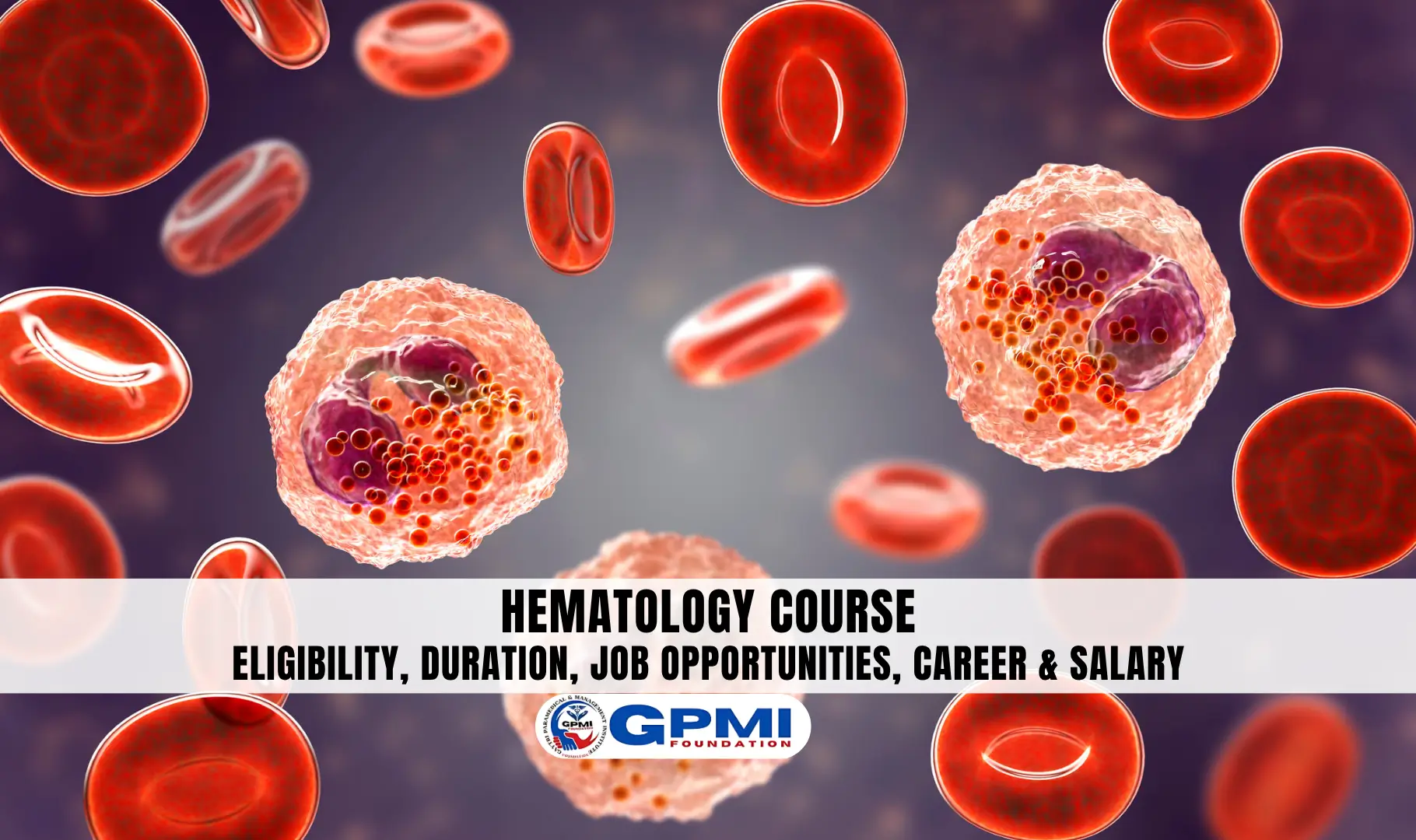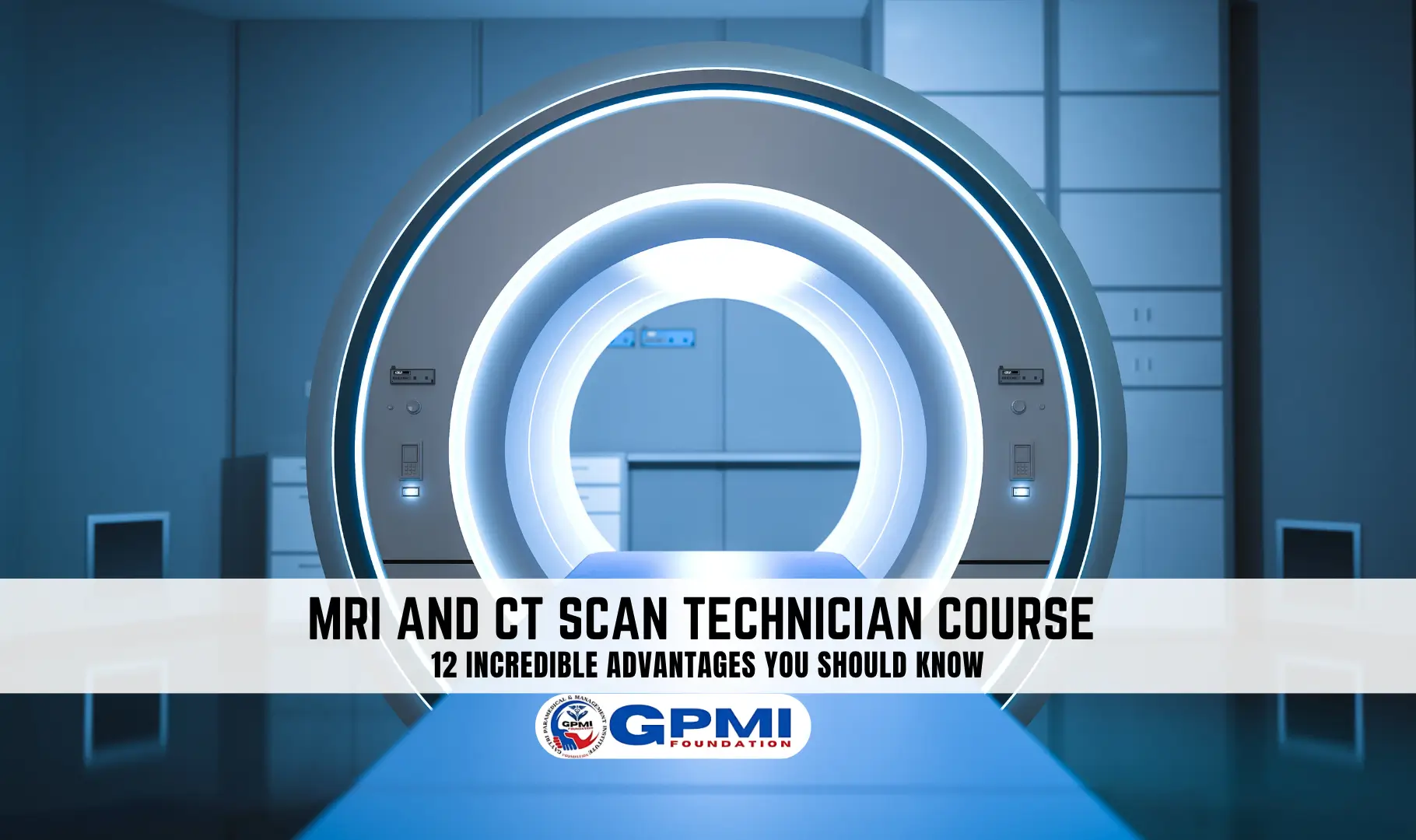Are you looking to join the medical field but don’t want to spend many years in college? 2 Year Medical Courses after 12th could be the perfect choice for you! These courses are short, smart, and career-ready.
In just two years, you can learn practical medical skills, earn a diploma or advanced diploma, and start working in hospitals, labs, clinics, or even start your own small healthcare setup. Whether you are interested in lab work, emergency care, X-rays, or helping doctors in the operation theatre, there’s something for everyone.
The best part? These courses are open to students who have passed 12th. You don’t need NEET or expensive coaching classes. This article will help you explore the 11 best 2-year medical courses after 12th in 2025, so you can choose the one that fits your dream career. Read on to find a course that gives you respect, a stable job, and a bright future in healthcare!
Table of Contents
What Are 2 Year Medical Courses After 12th?
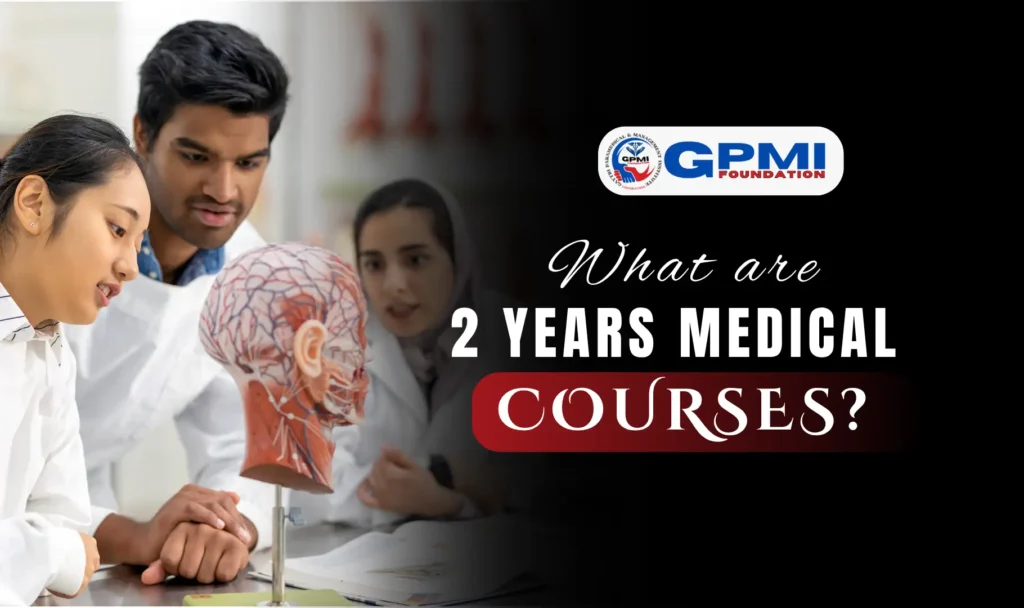
2-year medical courses after 12th are short-term diploma or advanced diploma programs in the healthcare field. These courses are designed for students who have completed their 12th class, especially with science (PCB or PCM), and want to quickly start a career in the medical sector. Unlike MBBS or BDS, which take 5 years or more, these courses are completed in just 2 years and focus on skill-based training.
Students learn how to work as lab technicians, X-ray technicians, dialysis staff, nursing assistants, OT technicians, and more. These courses combine classroom learning with practical experience in hospitals or labs. The goal is to prepare students for real-life healthcare jobs where they assist doctors, handle machines, or take care of patients.
The best part is that most of these programs don’t need NEET, making them easier to join. These 2-year courses offer job security, respect, and a chance to grow in the medical field without spending too many years studying.
11 Best 2 Year Medical Courses
2-year medical courses are short term and skill-based programs. In just two years, you can start earning, gain respect in society, and work in hospitals, clinics, labs, or diagnostic centers.
These programs give you hands-on experience and prepare you for real-life medical jobs. So let’s explore the 11 best 2-year medical courses after 12th in 2025 that can shape your future in the healthcare industry.
1. Diploma in Medical Lab Technology (DMLT)
The Diploma in Medical Lab Technology (DMLT) is a 2-year medical course designed for students who want to build a career in pathology labs, hospitals, diagnostic centers, and research labs.

It focuses on practical skills and scientific knowledge related to the testing of blood, urine, stool, and other body samples. Lab technicians play a vital role in diagnosing diseases, which helps doctors give accurate treatment.
- Eligibility: Must have passed 12th with Science (either PCB or PCM). Student from other streams may apply for DMLT Vocational Course.
- Course Fees: Fees may vary between ₹30,000 to ₹70,000 per year depending on the institute. Scholarships and EMI options are available in many private institutes
- Career Scope: Lab Technician, Pathology Assistant, Blood Bank Technician, Laboratory Supervisor, Microbiology or Biochemistry Lab Assistant
- Job Provider: Private and government hospitals, diagnostic labs, emergency centers, and even in blood banks.
2. Diploma in Radiology and Imaging Technology
The Diploma in Radiology and Imaging Technology is a 2-year medical course designed to train students in handling imaging equipment used for diagnosing medical conditions. This includes operating X-ray machines, CT scanners, MRI machines, and ultrasound devices.
Radiology technicians play a vital role in the early detection of diseases and injuries by producing clear, accurate medical images that help doctors make correct diagnoses.
- Eligibility: Candidates must have passed 12th with Science stream (PCB or PCM). Minimum age: 17 years, Other Stream students may apply for vocational course. Direct admission available in most institutes.
- Course Fees: Fees range from ₹35,000 to ₹80,000 per year depending on institute reputation and facilities. EMI and scholarship options are offered by some private colleges
- Career Scope: X-ray Technician, CT Scan Technician, MRI Technician, Radiology Assistant, Diagnostic Imaging Operator.
- Job Opportunities: Jobs available in hospitals, diagnostic labs, trauma centers, and radiology clinics
- Salary: Average salary ₹10,000 to ₹20,000 for fresher, Experienced professionals can earn ₹20,000 to ₹50,000 per month or more
Key Points:
- In-demand course due to growing diagnostic industry
- Safe working environment with modern machines
- Job opportunities available in both government and private sectors
- You can pursue B.Sc. in Radiology for career advancement
This 2-year medical course is ideal for students who enjoy technology and want to work in a respected medical setting without direct patient handling.
3. Diploma in Operation Theatre Technology (DOTT)
The Diploma in Operation Theatre Technology (DOTT) is a 2-year medical course that trains students to work in surgical units, operation theatres, emergency rooms, and intensive care units.

Key Points: DOTT (2-Year Medical Program)
- High demand in both urban and rural hospitals
- Direct involvement in life-saving procedures
- Teaches discipline, hygiene, and critical emergency support
- Can upgrade to B.Voc. or B.Sc. in OT Technology for career growth
This course is ideal for those who want to work behind the scenes and play a crucial role in surgeries and medical procedures. OT Technicians are responsible for preparing and maintaining operation theatres, sterilizing surgical instruments, assisting doctors during operations, and ensuring infection control throughout the procedure.
- Eligibility: Must have completed 12th with Science (PCB or PCM), Minimum age: 17 years, Admission is usually based on merit or direct entry, Other streams students may apply in vocational OTT course.
- Course Fees: The fee ranges between ₹35,000 to ₹80,000 per year, depending on the college. Private institutes may offer scholarships, discounts, or installment payment plans
- Career Scope: Operation Theatre Technician, Surgical Assistant, Anesthesia Technician, CSSD Technician (Sterilization Unit), Employment opportunities in government/private hospitals, nursing homes, trauma centers, and emergency wards.
- Starting salary: ₹15,000–₹30,000/month; higher with experience
DOTT is a job-ready, skill-based program for students who want to be part of the surgical team and serve in the core area of hospital care.
4. Diploma in Dialysis Technology
The Diploma in Dialysis Technology is a 2-year medical program that trains students to operate dialysis machines and assist in treating patients suffering from kidney failure. Dialysis is a life-saving procedure for individuals whose kidneys are not functioning properly.
As a dialysis technician, you will be responsible for preparing patients for dialysis, monitoring them during the procedure, operating and maintaining dialysis equipment, and providing emotional support to patients.
- Eligibility: Must have passed 12th with Science stream preferred, Minimum age: 17 years, No NEET or entrance exam required.
- Course Fees: Course fees range from ₹30,000 to ₹75,000 per year, depending on the institute.
- Career Scope: Dialysis Technician, Renal Dialysis Assistant, Dialysis Machine Operator.
- Job opportunities in hospitals, nephrology clinics, dialysis centers, and home dialysis care
- Starting salary: ₹18,000 to ₹35,000 per month, with higher pay in private hospitals
Key Points:
- High demand due to rising kidney-related diseases
- Patient-focused job with strong emotional impact
- Teaches both technical and soft skills
- Career growth possible through B.Voc. or advanced diploma programs
This course is perfect for compassionate students who want to work in a hospital setting and make a difference in the lives of chronic kidney patients.
5. Diploma in Emergency Medical Technician (EMT)
The Diploma in Emergency Medical Technician (EMT) is a skill-based 2-year medical course that trains students to provide critical medical care during emergencies. EMTs are the first responders at accident sites, disasters, and medical emergencies.

Key Points: EMT Advance (2-year medical course)
- A high-responsibility role that requires quick decision-making
- Physical and mental strength are important
- Opportunities to work in both government and private sectors
- Great stepping stone toward advanced paramedic or nursing roles
They are trained to handle trauma care, perform CPR, control bleeding, stabilize patients, and transport them safely to hospitals. EMTs play a vital role in saving lives before a doctor or hospital comes into the picture.
- Eligibility: Must have passed 12th Science Proffered, Some institutes accept 10th pass for basic-level EMT programs, but 12th is preferred for 2-year diploma.
- Course Fees: Fees range between ₹25,000 to ₹65,000 per year, depending on the institute.
- Career Scope: Emergency Medical Technician (Ambulance/ER), Paramedic Assistant, First Aid Responder, Trauma Care Assistant.
- Job opportunities in hospitals, ambulances, trauma centers, 108 emergency services, disaster response units, and rescue teams
- Salary ranges from ₹15,000 to ₹35,000/month depending on experience
This course is ideal for those who want a hands-on, fast-paced medical job where they can truly save lives in critical situations.
6. Diploma in Physiotherapy (DPT)
The Diploma in Physiotherapy (DPT) is a 2-year medical program that focuses on helping patients recover from injuries, surgeries, strokes, or physical disabilities.
This course trains students in therapeutic exercises, massage techniques, heat therapy, electrotherapy, and the use of physiotherapy machines. Physiotherapists play an important role in improving mobility, reducing pain, and restoring physical strength, especially after accidents or operations.
- Eligibility: Must have passed 12th with Science (preferably PCB), Minimum age: 17 years
- Course Fees: Fees range from ₹30,000 to ₹75,000 per year, depending on the college or institute. Government institutes may offer lower fees and scholarships.
- Career Scope: Work as Physiotherapy Assistant, Rehabilitation Technician, Clinic Assistant, Orthopedic and Sports Injury Aide.
- Work opportunities in hospitals, private clinics, rehabilitation centers, old age homes, sports centers, and even with athletes
- Starting salary ranges from ₹15,000 to ₹30,000/month, with higher pay in private setups
Key Points:
- Focuses on long-term physical healing and recovery
- High demand in orthopedic, neuro, and post-surgical care
- Can pursue BPT (Bachelor in Physiotherapy) after diploma for further growth
- Helps build a respected and people-focused career
DPT is a great option for students who want a stable healthcare job while directly improving the lives of patients through physical care and rehabilitation.
7. Diploma in Optometry Technology
The Diploma in Optometry is a 2-year medical course that trains students to examine, diagnose, and treat common vision problems. Optometrists are experts in eye care and vision health.

Key Points: DOT (2-year medical program)
- High demand due to increased screen time and eye-related issues
- Opportunity to work in retail and clinical setups
- Can pursue B.Optom or B.Voc. in Optometry for higher roles
- Offers both technical and customer service experience
In this course, students learn how to perform eye tests, suggest corrective lenses, assist in fitting contact lenses, and detect eye conditions like cataracts, glaucoma, and retinal issues. They also learn how to handle modern optometry tools and optical machines.
- Eligibility: Must have passed 12th Science preferred, other streams student may apply for vocational courses.
- Course Fees: Fees typically range from ₹30,000 to ₹70,000 per year, Scholarships or installment plans may be available in private institutes.
- Career Scope: You can work as Optometrist Assistant, Vision Technician, Optical Shop Executive, Lens Manufacturing or Fitting Specialist
- Job Places: Employment in eye hospitals, optical chains, private clinics, and lens companies, or You can open your own optical shop after gaining experience
- Starting salary: ₹15,000 to ₹35,000/month
This course is ideal for students who want to enter a growing field in eye care and build a respected career with minimal investment and stable job options.
8. Diploma in Dental Assistant
The Diploma in Dental Assistant is a 2-year paramedical course that prepares students to assist dentists in clinical and administrative tasks.
Dental assistants play a key role in managing dental tools, preparing patients for procedures, sterilizing equipment, handling patient records, and supporting dentists during surgeries and cleanings. The course offers both theoretical knowledge and hands-on training in modern dental clinics.
- Eligibility: 12th pass with Science (preferably PCB). Minimum age: 17 years. Direct Admission.
- Course Fees: Course fees range from ₹25,000 to ₹60,000 per year, depending on the institute. Some private colleges offer flexible fee options or scholarships.
- Career Scope: Work as Dental Assistant, Oral Surgery Assistant, Dental Lab Technician (with experience), Receptionist cum Dental Helper in Clinics
- Job opportunities in dental clinics, hospitals, dental colleges, and oral health centers
- Salary ranges from ₹12,000 to ₹30,000/month depending on location and experience
Key Points:
- Fast-growing field due to rising awareness of dental hygiene
- Clean, professional working environment
- Good balance of patient care and administrative work
- Can pursue dental technician or hygienist roles later
This course is a great choice for students who want to work in the healthcare field with a focus on oral care and patient support, without going through a long or expensive dental degree.
9. Diploma in Medical Record Technology
The Diploma in Medical Record Technology (MRT) is a 2-year medical course that focuses on the management of patient records, healthcare data, and hospital information systems. Medical Record Technicians play a key role in maintaining, organizing, and securing patient data for hospitals, clinics, and healthcare institutions.
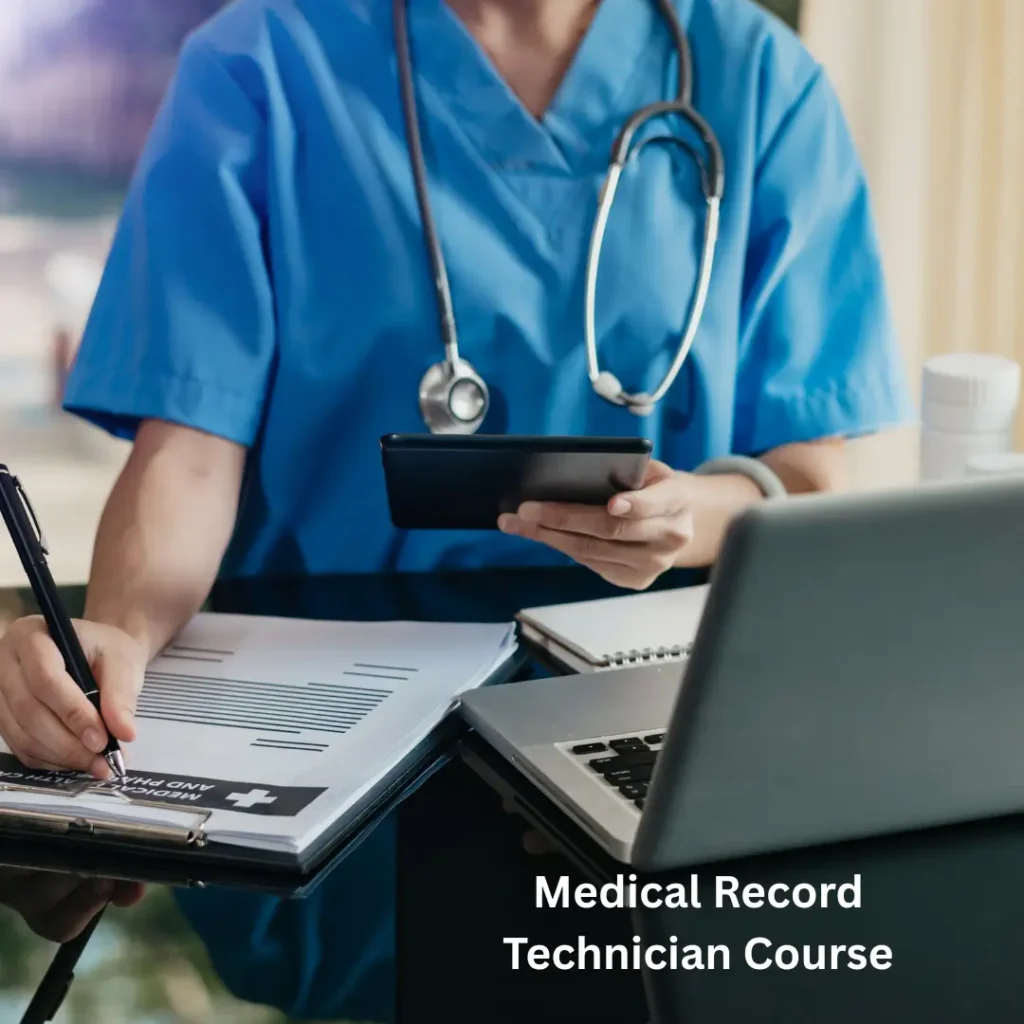
Key Points: DMRT (2-Year Medical Program)
- Ideal for students who prefer desk jobs and administrative tasks
- Teaches organization, data privacy, and healthcare documentation
- Growing demand due to digitalization of health records
- Can pursue further studies in health information management, MBA in Hospital Management or hospital administration
During the course, students learn about medical terminology, coding systems (like ICD), computer applications in healthcare, and the legal aspects of medical documentation.
The training helps ensure that patient information is accurately recorded and safely stored, which is essential for quality treatment, insurance claims, and audits.
- Eligibility: 12th Pass with Science (PCB or PCM). Admission is usually based on merit or direct entry
- Course Fees: Course fees typically range between ₹25,000 to ₹60,000 per year depending on the institute
- Career Scope: Work as Medical Record Technician, Health Information Clerk, Data Entry Operator in Hospitals, Insurance Claim Analyst (with experience)
- Job opportunities in hospitals, diagnostic centers, government health departments, insurance companies
- Starting salary: ₹12,000 to ₹25,000/month
This course is a smart choice for those looking to enter the medical field through a non-clinical yet essential and respected role.
10. Diploma in Nursing Care Assistant
The Diploma in Nursing Care Assistant (NCA) is a 2-year medical program that trains students to provide basic nursing care to patients in hospitals, clinics, and home care settings.
Nursing Care Assistants work closely with registered nurses and doctors, helping patients with their daily needs such as bathing, feeding, dressing, moving, and monitoring vital signs. They play a compassionate and essential role in ensuring patient comfort, hygiene, and emotional well-being.
This course includes classroom instruction along with practical training in hospitals. Students learn about patient safety, infection control, first aid, basic pharmacology, and communication skills. It is a perfect program for students who are caring by nature and want to serve patients directly.
- Eligibility: Must have passed 10th or 12th standard from a recognized board. Minimum age: 17 years. No NEET or entrance exam required
- Course Fees: Fees range between ₹20,000 to ₹50,000 per year, depending on the institute
- Career Scope: You can work as Patient Care Assistant, Home Health Aide, Hospital Ward Assistant, Old Age Home Caregiver.
- Job opportunities in hospitals, nursing homes, NGOs, rehabilitation centers, and private homes
- Starting salary: ₹10,000 to ₹20,000/month, higher with experience
Key Points:
- High demand for skilled caregivers in India and abroad
- Emotionally fulfilling career helping patients in need
- Foundation course for those interested in pursuing GNM or ANM later
- Teaches hands-on patient care, hygiene, and basic medical support
This course is ideal for students who wish to enter the healthcare field with a focus on caring and service, and who want to make a real difference in the lives of others.
11. Diploma in Cath Lab Technology
The Diploma in Cath Lab Technology is a 2-year medical course designed to train students in cardiovascular care and diagnostic procedures performed in catheterization laboratories (cath labs).
Cath labs are specialized hospital departments where tests like angiography, angioplasty, and pacemaker implantations are performed under the supervision of cardiologists. This course equips students with the knowledge and skills to assist in these procedures by operating imaging equipment, monitoring patients, and handling cardiac devices.
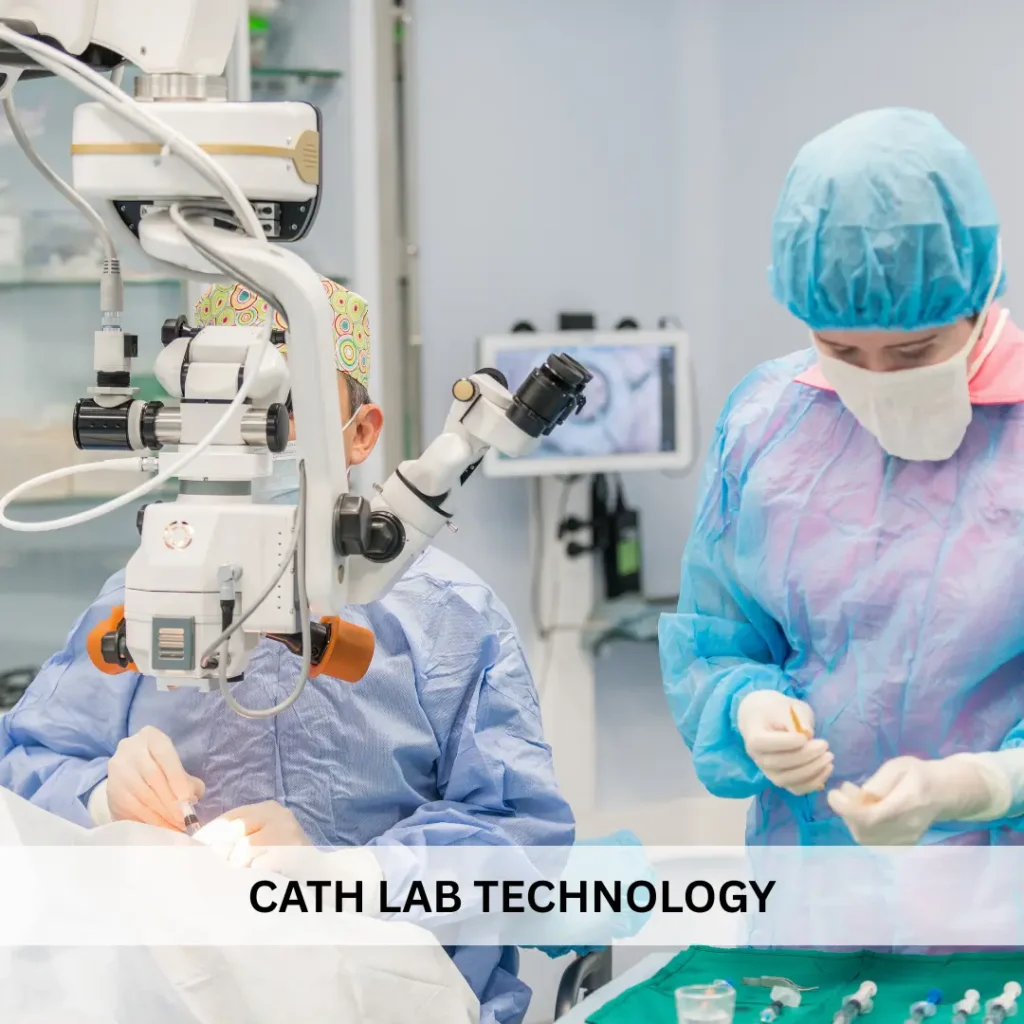
Key Points: DCAT (2-Year medical course)
- High demand due to increasing heart-related cases in India
- Involves working with cutting-edge medical equipment
- Offers a stable, well-respected career in cardiac care
- Can pursue further studies in cardiovascular technology or B.Sc. in Cardiac Care Technology
During the course, students learn about human anatomy (especially the heart), ECG monitoring, radiation safety, cardiac pharmacology, and emergency protocols. Practical training in hospital cath labs is a key part of the program.
- Eligibility: Must have passed 12th with Science (PCB or PCM)
- Course Fees: Course fees generally range from ₹35,000 to ₹80,000 per year, depending on the institute
- Career Scope: Work as Cath Lab Technician, Cardiac Technician, Cardiology Assistant, Cardiovascular Technician.
- Job Sittings: Employment in heart hospitals, cardiac centers, cath labs in multi-specialty hospitals
- Starting salary: ₹20,000 to ₹40,000/month
This course is ideal for students interested in heart health, technology, and playing a direct role in life-saving medical procedures.
Why Choose a 2-Year Medical Course?
Here are some strong reasons why a 2-year medical program can be a smart career move:
- Quick Entry to Healthcare: You can complete your studies in just two years and start working while others are still in college.
- Skill-Based Learning: These courses focus on real-world skills that employers need.
- High Demand: India has a growing need for trained technicians in every area of healthcare.
- Affordable: Most diploma courses are budget-friendly and do not require expensive coaching or NEET exams.
- Flexible Careers: After working for a few years, you can even upgrade to advanced diplomas or degrees later.
Conclusion
In 2025, the healthcare industry is booming, and there’s a high demand for skilled paramedical staff. If you want a stable job, good income, and the chance to help people, then a 2-year medical course after 12th can be your stepping stone to success.
Whether you choose lab work, X-rays, patient care, or emergency services, each course offers a unique opportunity to make a difference in someone’s life. You don’t need to wait for NEET or study for 5 years. Start your journey with a 2-year medical diploma, build your career, and grow step-by-step in the medical field.
So, pick a 2-year medical course that matches your interest, apply to a good institute, and begin your medical career today!



